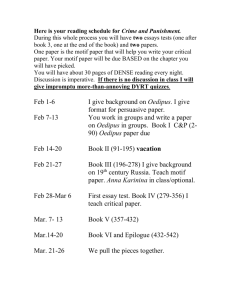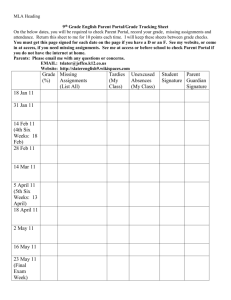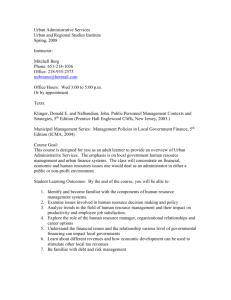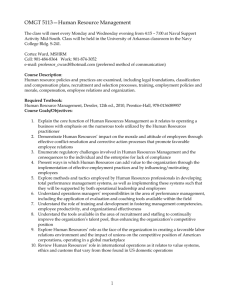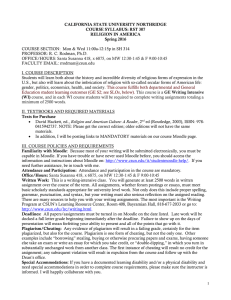organization behavior - University of Arkansas
advertisement
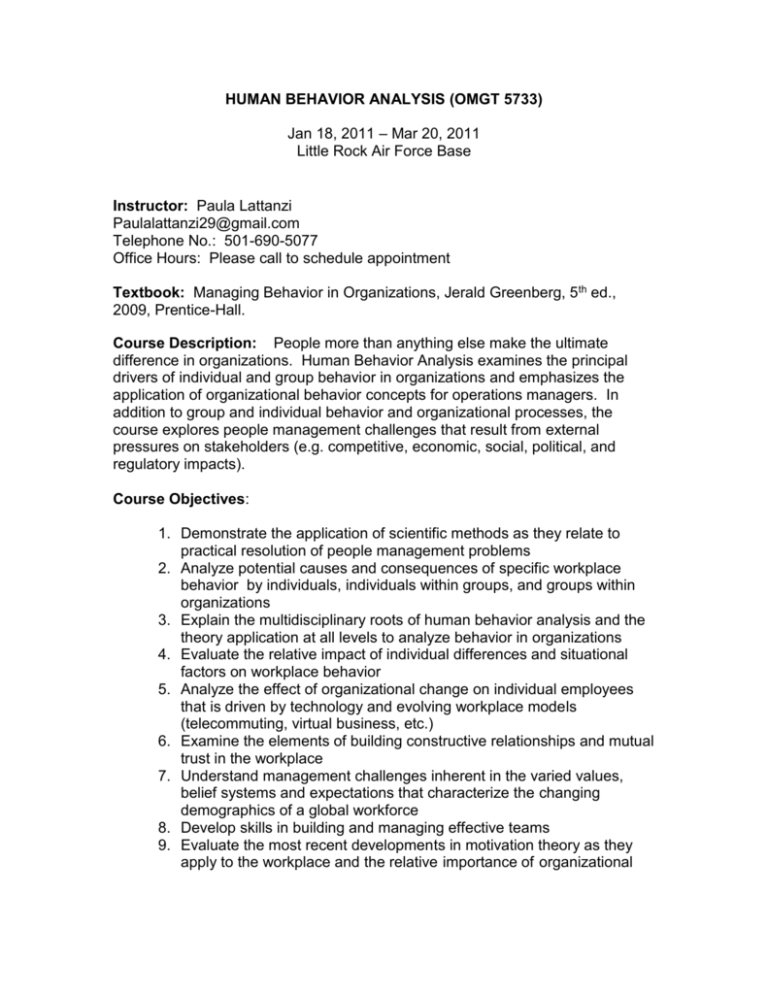
HUMAN BEHAVIOR ANALYSIS (OMGT 5733) Jan 18, 2011 – Mar 20, 2011 Little Rock Air Force Base Instructor: Paula Lattanzi Paulalattanzi29@gmail.com Telephone No.: 501-690-5077 Office Hours: Please call to schedule appointment Textbook: Managing Behavior in Organizations, Jerald Greenberg, 5th ed., 2009, Prentice-Hall. Course Description: People more than anything else make the ultimate difference in organizations. Human Behavior Analysis examines the principal drivers of individual and group behavior in organizations and emphasizes the application of organizational behavior concepts for operations managers. In addition to group and individual behavior and organizational processes, the course explores people management challenges that result from external pressures on stakeholders (e.g. competitive, economic, social, political, and regulatory impacts). Course Objectives: 1. Demonstrate the application of scientific methods as they relate to practical resolution of people management problems 2. Analyze potential causes and consequences of specific workplace behavior by individuals, individuals within groups, and groups within organizations 3. Explain the multidisciplinary roots of human behavior analysis and the theory application at all levels to analyze behavior in organizations 4. Evaluate the relative impact of individual differences and situational factors on workplace behavior 5. Analyze the effect of organizational change on individual employees that is driven by technology and evolving workplace models (telecommuting, virtual business, etc.) 6. Examine the elements of building constructive relationships and mutual trust in the workplace 7. Understand management challenges inherent in the varied values, belief systems and expectations that characterize the changing demographics of a global workforce 8. Develop skills in building and managing effective teams 9. Evaluate the most recent developments in motivation theory as they apply to the workplace and the relative importance of organizational 10. reward systems vs. managerial behavior in motivating individuals and groups 11. Examine factors involved in individual and group decision making focusing on those that can enhance or degrade the quality of decision outcomes in organizations 12. Analyze formal and informal communication processes and networks in organizations that can positively or adversely affect workplace morale and organization effectiveness Class Schedule: Week 1 (Jan 18 & 20)): Introductions Syllabus Review Ch 1: The Field of Organizational Behavior Ch 2: Organizational Justice, Ethics, and Corporate Social Responsibility Week 2 (Jan 25 & 27): Ch 3: Psychological Processes in Organizations: Personality, Perception, and Learning Ch 4: Coping with Organizational Life: Emotions and Stress Homework Assignment #1 (Due Feb 3) Week 3 (Feb 1 & 3): Ch 5: Work – Related Attitudes: Prejudice, Job Satisfaction, and Organizational Commitment Ch 6: What Motivates People to Work? Homework Assignment #2 (Due Feb 10) Part I and Part II Review (Chapters 1 – 6) Week 4 (Feb 8 & 10): Test #1 Short Answer Essay Chapters 1 – 6 Ch 7: Interpersonal Behavior in the Workplace Ch 8: Organizational Communication Homework Assignment # 3 (Due Feb 17) Week 5 (Feb 15 & 17): Ch 9: Group Processes and Work Teams Ch 10: Making Individual & Group Decisions in Organizations Week 6 (Feb 22 & 24) Ch 11: The Quest for Leadership Homework Assignment #4 (Due Mar 3) Part III Review (Ch 7 – 11) Test #2 Short Answer Essay Ch 7 – 11 Week 7 (Mar 1 & 3) Ch 12: Culture, Creativity, and Innovation Ch 13: Designing Effective Organizations Homework Assignment #5 (Due Mar 10) Week 8 (Mar 8 & 10) Ch 14: Managing Organizational Change: Strategic Planning and Organizational Development Part IV Review (Chapters 12 – 14) Test #3 Short Answer Essay Chapters 12 – 14 Guest Speakers: Industry Experts May Be Utilized for Some Topics Grade Structure: Course Grades Calculated Using Formula Below: 20% Homework Assignments 20% Attendance & Participation 60% Tests Grade Scale: A B C D F 90 - 100 89 – 80 79 – 70 69 – 60 Below 60 Absences, tardiness and/or leaving early – Occasionally, unavoidable circumstances such as military and civilian work requirements necessitate that a student be absent for part or all of a class session. Please notify the instructor about absences for any class before that class begins through email or telephone message. Work requirements and illness that prompt students to be absent from a class will deemed excused. Two unexcused absences from class will reduce the overall grade for the course by one letter grade. The maximum grade awarded for students with three unexcused absences is “C”. Compiling more than three unexcused absences is justification to issue a failing grade for the course. Academic Dishonesty Policy: The University of Arkansas strives to be a center of academic excellence. As part of our Statement of Ethics, the University strives to preserve academic honor and integrity by repudiating all forms of academic and intellectual dishonesty, including cheating, plagiarism and all other forms of academic dishonesty. Academic dishonesty is unacceptable and is subject to a disciplinary response. Students who are caught cheating or committing plagiarism may be given a failing grade in the course by the professor and may be subject to dismissal or further discipline. Plagiarism is often misunderstood as referring only to passing off another’s writing as one’s own. The definition also extends to ideas and arguments taken from others’ work without proper citing of the original source. It is also not permissible to construct papers or reports by merely “cutting and pasting” and then just citing another’s work. In writing for homework or projects, you should read and learn, process information through your mind, relate ideas, and then express your take on the material you’ve read in your own words. Cite the references where you found your information. If you do use someone else’s words, do so sparingly, use quotation marks, and cite. A complete statement of the U of A’s Academic Honesty Policy is available in the UA Student Handbook and the UA Graduate Catalog. Inclement Weather Policy: If the base or campus closes for inclement weather or other reasons, your site coordinator will be the first to know. She will call the professors and send the students e-mail advising of class cancellations. If your professor cancels a class he/she will contact the site coordinator, and she will send an e-mail to the students in that class advising of class cancellation.
